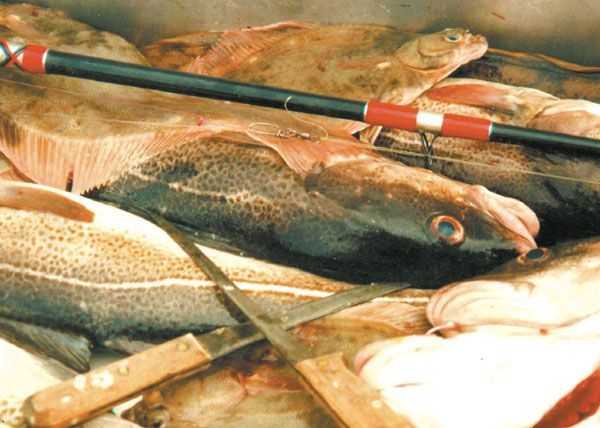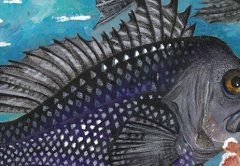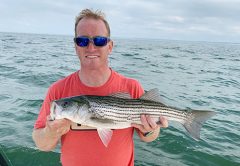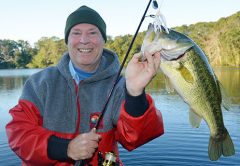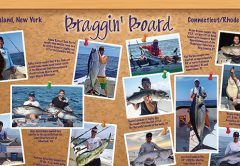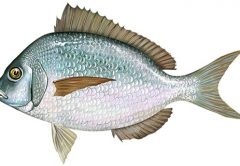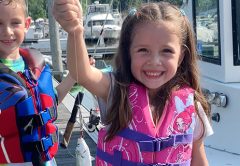For about a month (as of this writing), I’ve been boning up on my knowledge of fisheries management current events, reading a ton of backlogged groundfish news, trying to nail down some specifics about a recent crusade by several environmental groups advocate for deep-ocean coral beds that have been discovered in a number of the notches in the continental slope where we target tuna or billfish.
The real static is that preliminary data suggest significant overlap between these coral clusters and the key winter squid and fluke grounds for the drag fleet in the northeast canyons. There’s the continued catastrophic disconnect between regulators and regulated in the black sea bass fishery, and there’s growing concern on all fronts over the role(s) climate change will play in the distribution of key species ten or 20 years from now. There’s the crazy and apparently intensifying change in the precariously-balanced oceanography of the Gulf of Maine.
There’s the New England Fishery Management Council’s continuing work on the Omnibus Habitat Amendment, and there’s no shortage of doom and gloom around the docks in cod country to our east and north.
Fisheries study is like all other research: The more you read, hear, observe, and ponder, the more complicated it all gets, and the more time you’ll spend in inward purgatory trying to account for the sea of variables—reconciling all the different perceptions of the same basic reality. It’s one lesson I have learned and relearned every time I’ve taken on a piece that requires any amount of advance research: Over-researching creates as many problems as slacking on your background learning.
So, as I’ve marched through the initial phase of applying for a Governor- appointed “at-large” seat that will become vacant when long-time Council fixture, Frank Blount terms out this fall, I’ve challenged myself to slog through as much basic gumshoe work right at the outset, rather than digesting all of it in some fish-policy mania when the bite comes alive in August.
So far, all I’ve really managed to pin down is the fact that the fish are in tough shape, and the fishermen are in tough shape—and that the reasons for both remain mostly unclear, and that we’re probably not going to have better answers anytime soon. The idealistic fervor that launched me into this whole mess is dissipating into a familiar gloom, the weight of the 10-headed fisheries problem and the accompanying fear this whole thing is just FUBAR—catastrophic failure in progress for 30 years.
The pure “environmentalist” interests whose unspoken core belief is that removing humans from the ocean—the marine food chain—will fix everything are no better than the right-wing fringe citing loose-fitting scripture against demonic forces like stock assessments.
I comb through a half-foodie/half-resource-management piece about one seafood wholesaler’s ingenious market solution to mounting ecological fallout from a population boom of invasive green crabs: market invasive green crabs to Boston-area eateries; and give some fishermen a contingency plan during a rough financial patch; and try to put a significant dent in the burgeoning green crab population that has had such a profound—and well-documented— negative impact on the coastal ecology of the Gulf of Maine.
It’s fascinating. And it’s complicated—every fish or crustacean or bivalve, every estuary or long, sloping beach or inlet flanked by jetties, every fisherman, every stir of ocean current or puff of wind, has impacts beyond the most obvious unit of measurement. Every piece of our marine ecosystems needs to be counted. The key fisheries management chore, according to the present- day mandates, will be to come up with statistical means to account for whole networks of variables (such as the symptoms of climate change, or the energy carrying capacity of a given plot of water) and build more ambitious, data- hungry equations to crunch whole complexes of organisms.
After a couple of days trudging through literally months of backlogged “news,” toward the end of a preliminary interview with DEM staff, a new story breaks. During a quick break, I get a note from a friend of mine: “You hear about Carlos?” At first, Carlos who? I glance at my e-mail and everything snaps into focus. The fisheries news feeds are running full-tilt.
“Carlos Rafael arrested on federal conspiracy charges,” read the first in a stack of headlines. Oh. That Carlos. The unlikely fish pirate turned folk hero by the hard-ridden fish town of New Bedford, MA. The owner of the largest fleet of scallop and groundfish boats in New England, and the single largest stakeholder in New England’s extraordinarily consolidated cod fishery.
Less discussed—until now—has been his foremost credential: The man who against the dam. Strike if your line makes the slightest twitch.
The second hot spot around a spillway is the deeper water just below the falls. Here you might find a fish or two holding tight the bottom. Quarter this water with your cast or allow a garden worm to drift unaided through this stretch. Approach quietly and slowly as you step up to the water here for these fish tend to be very alert and they will quickly move out if they see you.
A third spillway area you’ll want to work is downstream at the first few bends. Expect one or two spillover trout to tuck under any undercuts here. A small spinner danced in front of any pocket or logjam should entice these fish but you can also try rolling a nightcrawler or garden worm under the bank.
crashed cod stocks, among other species managed under the heading, “groundfish,” it now seems likely. That, now that I see it in plain black and white, just put five years back on my fish-weary hide.
For five-plus years since the New England Fishery Management Council passed Amendment 16, a massive action that totally rewired groundfish management, most notably via creation of the now-infamous “sector” program (which essentially applied the root concept of Individual Transferrable Quota, or ITQ, to multi-permit/-vessel fishing collectives, Carlos Rafael has been a poster child for unethical fishing practices.
The most famous among a whole host of dodgy .maneuvers designed to render sweeping new changes to cod management more or less toothless was running up into the Gulf of Maine to soak up the more concentrated codfish off the east side of Stellwagen Bank, on way less fuel, closer to safe harbor than out on Georges Bank. It’s now clear that he wasn’t just filling his harder-to-catch Georges Bank cod allocation with Gulf of Maine-origin fish—a major no-no, since it was widely believed in those years (2010- 2014, say) that it was the much healthier GOM cod stock that held the potential to actually rebuild cod populations.
If extracting all that under-the-radar cod weren’t horrifically misguided enough, Rafael’s fleet (among other draggers) ran a rotation so the meat was coming out more or less all day every day. And we can now safely extrapolate from Rafael’s admission, to undercover federal agents some time before the late-February raids, that the lack of uniform size or trip limits across the New England groundfish fleet (and, for at least 2012, the year the new system went live, zero federal fisheries boardings or dockside sampling) gave Rafael’s groundfish boats a license to steal. What cod needed to go out to buyers without subtracting from the actual allocated pounds went out labeled as another species for which they had more allocation than they could fill.
When you take Rafael the legendary ballbuster and generally nice guy, and look at the maneuvering that situated him perfectly to thrive on consolidation (start with owning multiple vessels and a fish house) with, it’s easy to forget the cost we have all been paying for his greed.
Coming out of my own fisheries reading bender, preparing to make my case to get on the New England Council, it was, as it always seems to be, the big conceptual problems—the to-do list for future science—that make the challenges unfathomably huge and complicated.
Perverse as I know this is going to sound, the cod collapse became a hell of a lot more manageable when I could peel the algorithms of climate change, and table all the terrifying recent changes to the oceanography of the Gulf of Maine for the moment. The huge and complex predator-prey abundance ratios? Rapidly rising “down temp” on the offshore cod grounds? Good God, I’m just one man! These problems are huge and I’m so small….
Wait, what was that?
“Carlos stole every last codfish that wasn’t bolted down?” Is that what they just said?!
That sounds like the universe I know—like business as usual. Greedy men doing what they do best. Don’t get me wrong, the science is going to be mission-critical on the 20-year range of fish-management. But the waterman in me says that when anything collapses as fast as cod just did, somewhere in the shadows not so far from the scene of the crime, there’s a guy—maybe a few guys—who just made an awful lot of short bucks.
That problem we’ve handled before—millions of times. It doesn’t do much for my cynicism, but at least that game runs on simple rules and predictable strategy.

